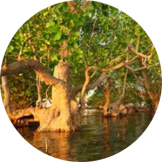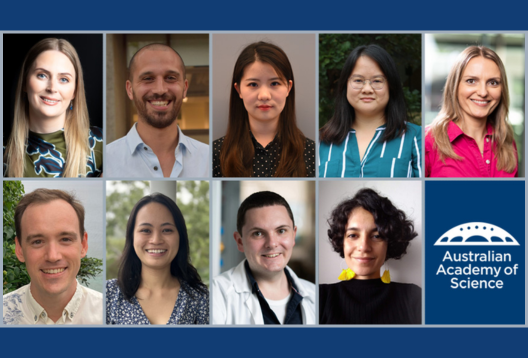Thomas Davies Research Grant for Marine, Soil and Plant Biology


Award highlights
- The fund offers annual science grants of up to $20,000 each to early-and mid-career researchers in the field of marine, soil and plant biology.
- The grant is funded through a generous philanthropic bequest from the estate of the late Thomas Lewis Davies.
The Thomas Davies Research Grant for Marine, Soil and Plant Biology is funded through a generous philanthropic bequest from the estate of the late Thomas Lewis Davies to the Australian Academy of Science. The fund offers annual science grants of up to $20,000 (GST exclusive) each to early-and mid-career researchers in the field of marine, soil and plant biology.
For this grant early-and mid-career researchers are classified as scientists with up to 15 years post PhD experience. Grants are offered to successful applicants in November each year for projects to be commenced the next year. Funded activities are normally expected to be completed within two years from the date of award. Awardees can apply for project variations if their award proposals are impacted by extenuating circumstance.
Key dates
Below are the key dates for the application process. While we aim to keep to this schedule, some dates may change depending on circumstances.
GUIDELINES
The following guidelines and FAQ provide important information about eligibility, submission requirements, and assessment processes. Please review them carefully before submitting an application.
- Applicants must be Australian citizens or permanent residents.*
- Applicants should have held a PhD (or equivalent) for no more than 15 years at the time of the award closing date**.
- Grants should be spent within 24 months from the date of award.
- The work should lead to publication in high quality scientific journals.
Funded activities are normally expected to have been undertaken within two years from the date of award. Awardees may apply for extensions due to extenuating circumstances or to apply for variations to remove or adapt to barriers encountered to their planned research or travel.
* Includes the Special Category visa Subclass 444 for New Zealand citizens
** The Australian Academy of Science is committed to ensuring that all eligible researchers can be considered for awards and collects career interruption information to assess their opportunity to demonstrate scientific excellence. Accordingly, extensions to the post PhD eligibility requirements for early and mid-career awards will be provided for qualifying career disruptions.
A career disruption involves prolonged interruption to a nominee’s capacity to conduct full time equivalent (FTE) high-level research, either due to part-time employment or absence (for periods of one month or greater) and/or long-term partial return to work, to accommodate carer’s responsibilities, illness or other interruption.
The career disruptions here must have occurred post the date of the letter advising that the PhD thesis was passed and resulted in significantly reduced research productivity or nil research output. Career disruption periods will be taken into account for those who would otherwise be beyond the post PhD career eligibility requirements.
Funding may be used towards the costs of research assistant salaries, equipment and other costs not covered from other sources. Funding may not cover bench fees, managerial costs, insurance or visa costs or primary researcher salaries.
Funding can be used for conference expenses if it can be demonstrated that it is relevant for the project. However, this is not the primary objective of the award.
Applications must include the following:
- A research proposal structured under the following headings; aims & background, significance of the research, methodology, management implications of the project. Maximum of 1000 words.
- Itemised budget with brief justification for each item, the names and details of research funding already received (project title, funding body, amount).
- Brief CV including qualifications, summary of professional/research experience and publications/presentations. Maximum of three pages using size 12 font.
- Applicants must submit two referee reports with the application. The reports should be addressed to the Awards Committee and indicate the referee’s knowledge of the applicant’s research and their ability to carry out the project successfully. Maximum of one page using size 12 font for each report.
Late applications will not be considered.
- Applicants must commence their research within 12 months of being offered the Award, after which the offer will automatically lapse.
- The Award may be held concurrently with awards or grants from other institutions.
- Applicants can only receive funding from the same research or travelling research award once in a three calendar year period.
- Applicants may apply for more than one award but can only receive one Academy travelling or research award per calendar year.
- Supporting institutes and awardees are required to ensure that any research they undertake that is funded by the Australian Academy of Science adheres to the Australian Code for the Responsible Conduct of research, severe breach of these codes may result in the withdrawal of current and refusal of future funding support. Research involving Indigenous Australians must comply with the Guidelines for Ethical Research in Australian Indigenous Studies.
An annual report is required on the progress of the research project. The report should detail progress on the research goals outlined in the grant-holder’s proposal, and expected vs. actual expenditure to date.
If the Grant is held for two years, a report is also required at the end of the second year.
Applications are to be completed through an online form found by clicking on the Apply button on the top right of this web page when the round is open.
Travelling awards, research grants, workshop and lecture awards
- Can awarded funds pay for salary expenses?
- The Thomas Davies Research Grant funds can cover research assistant salaries, but not primary researcher salary expenses. The Aboriginal and Torres Strait Islander Scientist Award, the Margaret Middleton Fund and Max Day Fellowship Awards are not able to cover any salary expenses, for either primary researchers or research assistants.
- Can I apply for more than one research award?
- Yes – however, you can only receive one research award per calendar year. If you are ranked highly for multiple research awards, the assessment committee Chairs will decide which award is most appropriate for the project and applicant.
- Can I receive the same research award for a different project in subsequent years?
- No – once you have received a research award, you are not eligible to receive the same award for 3 calendar years.
- Can I use the funds to attend a conference?
- The Margaret Middleton Fund does not support conference expenses.
- The Aboriginal and Torres Strait Islander Scientist Award and the Max Day Fellowship funds can be used to cover the cost of travel to undertake research or attend relevant conferences/workshops.
- Thomas Davies Research Fund can support conference expenses if it can be demonstrated that it is relevant for the project, however, this is not the primary objective of the award.
- Can I use the funds to cover overhead expenses?
- No – each award notes the specific exclusions for use of funding; however, no award allows funds to be used towards bench fees, managerial, visa, insurance or infrastructure costs.
- Can I request feedback on my application assessment?
- No - applications are assessed based on the competitiveness of the proposal by a committee of scientists with diverse expertise. The Academy is not able to enter into discussion or correspondence regarding the reasons why an application is successful or not.
- Can I apply for the Max Day Environmental Science Fellowship if my PhD has not yet been through the confirmation process?
- No. If you are a PhD student applying for a Max Day Environmental Science Fellowship you must have completed the PhD confirmation process with your institution. Please note that specific confirmation process requirements may vary between institutions. Candidates are strongly encouraged to clarify the requirements with their institution prior to submitting the fellowship application.
PREVIOUS AWARDEES
- Dr Ashley Jones, Australian National University: Creating a Eucalyptus pangenome resource for adaptive forest restoration under climate change
- Dr Ben Clifton, University of Western Australia: Uncovering the role of metabolic exchange in phytoplankton-bacteria interactions
- Dr Elena Eremeeva, Queensland University of Technology: Managing “Forever Chemical” Pollution with Aptamer Biosensors in Marine, Plant, and Soil Ecosystems
- Dr Huan Liu, University of Technology Sydney: Understanding the Fate and Functional Effects of Biosolids-Derived Microplastics in Plants
- Dr Ilaine Silveira Matos, Adelaide University: Navigating synergies between drought, heat, and fire extremes: how prepared are Australian endangered plants?
- Dr Sally Lau, James Cook University: Harnessing animal genomes to understand East Antarctic Ice Sheet melt history
- Dr Timothy Ghaly, Macquarie University: Tiny solutions to global challenges: Optimising soil microbial communities for enhanced plant growth and sustainable agriculture
- Dr Valeriya Komyakova, University of Western Australia: Tiny Spaces, Big Impact: Unlocking Habitat Functionality for Juvenile Reef Fish through Micro-Complexity Design
- Dr Xiaoxiao Zhang, Australian National University: Fast next-gen evolution to create new-to-nature crop resistance genes
More information on the 2026 Thomas Davies Research Grant for Marine, Soil and Plant Biology awardees can be found here.
- Dr Amanda Dawson, CSIRO: Decoding the biological passport: tracing microplastic journeys using the ecocorona composition
- Dr Julian Greenwood, Australian National University: Establishing a transient assay to rapidly assess resistance responses in canola
- Dr Satomi Hayashi, Queensland University of Technology: Unveiling a native Australian plant’s defence: identifying the novel resistance gene against Tomato Yellow Leaf Curl Virus
- Dr Zeinab Khalil, University of Queensland: Soil microbial innovations for sustainable agrochemicals and plant pathogen control
- Dr Eve Maunders, University of Queensland: Investigating developmental dialogues in a marine sponge holobiont
- Dr Joseph Pegler, University of Newcastle: Understanding the mechanism(s) by which plant constituents sequester per- and poly-fluoroalkyl substance (PFAS) from contaminated water
- Dr Anne Sawyer, University of Queensland: Development of RNA-based controls for Phytophthora cinnamomi
- Dr Qi Yang, CSIRO: Uncovering microbial indicators: a sensitive and reliable approach to soil health measurement
- Dr Shima Ziajahromi, Griffith University: Fate and behaviour of biosolid-derived microplastics in Australian agricultural soils: lab-scale experiments and field evidence
More information on the 2025 Thomas Davies Research Grant for Marine, Soil and Plant Biology awardees can be found here.
- Dr Tanveer Adyel, University of South Australia: Fate and consequences of microplastics in Australian coastal wetlands
- Dr Laura Burchill, University of Melbourne: Discovery of the missing pathway for cysteinolic acid degradation in marine bacteria
- Associate Professor Nicole Carnt, University of New South Wales: Harnessing Acanthamoeba to control cyanobacteria blooms
- Dr Elena Colombi, University of Melbourne: Functional integration of nitrogen-fixation in Australian indigenous rhizobia to improve soil fertility
- Dr Florence Danila, Australian National University: Targeted approach to map the genetic switches of plasmodesmata formation in C4 leaves to improve crops
- Dr Pranali Deore, University of Melbourne: The ‘accumulation body’: an understudied autofluorescent organelle of marine microalgae
- Dr Paige Maroni, University of Western Australia: The deep sea and a deep phylogeny: reconstructing the backbone of deep-sea Amphipoda using phylogenomics
- Dr Ricky Milne, CSIRO: Furthering understanding of crop multi-pathogen resistance
- Dr Megan Outram, CSIRO: Engineering plant immunity receptors to combat rust phytopathogens
More information on the 2024 Thomas Davies Research Grant for Marine, Soil and Plant Biology awardees can be found here.
- Dr Martin Breed, Flinders University: Harnessing the root-associated microbiota of the invasive species buffel grass to improve its management
- Dr Cheong Xin Chan, University of Queensland: Deciphering the molecular regulations of heat tolerance in a coral algal symbiont
- Dr Onoriode Coast, University of New England: Exploring acclimation of wheat leaf respiration to warm nights
- Dr Maria Ermakova, Monash University: Developing a synthetic biology platform for high-throughput genetic engineering of sorghum to sustain crop productivity
- Dr Zahra Islam, University of Melbourne: The effect of fertilisers on the capacity of soil bacteria to scavenge atmospheric hydrogen
- Dr Chaoyu Li, University of Melbourne: Unravelling the newly discovered complete ammonia oxidiser (comammox) bacteria in terrestrial ecosystems
- Dr Mariana Mayer Pinto, University of New South Wales: Interactive effects of light pollution and ocean warming on herbivory in temperate reefs
- Dr Joanna Melonek, University of Western Australia: Uncovering the molecular function of mTERF proteins in fertility restoration in plants
- Dr Inka Vanwonterghem, University of Queensland: Mangrove forests’ unseen majority—unravelling microbial diversity, functions and interactions
More information on the 2023 Thomas Davies Research Grant for Marine, Soil and Plant Biology awardees can be found here.
- Dr Tatiana Soares da Costa, La Trobe University: Using supercomputers in the search for herbicides that inhibit amino acid production in plants
- Dr Orpheus Butler, University of Sydney: Uncovering the key biological role of molybdenum in soil formation
- Dr Zoe Doubleday, University of South Australia: How will climate change affect the brain functioning of octopuses?
- Dr Niloofar Karimian, Southern Cross University: Arsenic and antimony co-behaviour in soil under a changing climate – resolving interactions between microbiology and mineralogy
- Dr Akane Uesugi, RMIT University: Experimental tests of driver-passenger hypotheses – effects of weeds, fire, and soil microbes on native plant restoration
- Dr Linda Armbrecht, University of Adelaide: Probing ancient Antarctic krill populations
- Dr Michael Haydon, University of Melbourne: Time for growth – integrating metabolic signals in the plant circadian clock
- Dr Laura Ryan, University of Newcastle: The rainbow connection – the importance of substrate colour on biodiversity in urbanised intertidal zones
- Dr Benjamin Schwessinger, Australian National University: Deciphering the genomes and genetics of Australian orchid mycorrhizas from the Tulasnella and Serendipita genera
- Bonnie Holmes, University of the Sunshine Coast: Investigate the movements, habitat use and population structure of great hammerheads (Sphyrna mokarran) off the Australian east coast
- Amelia Wenger, The University of Queensland: Improving marine ecosystem health through better wastewater pollution management
- Jana Sperschneider, Australian National University: The rust genome in 3D: uncovering gene control mechanisms that allow fungi to devastate crops and native species
- Antony van der Ent, The University of Queensland: Novel trace element hyperaccumulator plant discovery in Australia
- Caitlin Byrt, Australian National University: Deciphering desalination mechanisms from salt-excreting mangroves
- Adam Frew, The University of Southern Queensland: How do different mycorrhizal fungal communities affect plant defences against belowground herbivory?
- Dr Jennifer Lavers, University of Tasmania: Seabirds as a vector for nutrients and pollutants on islands
- Dr Fiona Walsh, Consultant ethno-ecologist: What’s in and beyond the ‘fairy circles’? Investigation of patterns of pavements amongst desert spinifex grasslands
- Dr Danielle Verdon-Kidd, The University of Newcastle: Unlocking pre-instrumental climate secrets from the wood anatomy and isotopic composition of Avicennia marina
- Dr Edwin Lampugnani, The University of Melbourne: Marchantia; a simple model to study cellulose biosynthesis
- Dr Mark Waters, University of Western Australia: Interactions between light and smoke signals in plant development
- Dr Elisabeth Strain, The University of Melbourne: Assessing the role of restored and natural kelp forests in protecting against coastal erosion and ocean acidification
- Dr Simon Williams, The Australian National University: Establishing a synthetic biology platform for engineering plant innate immunity receptors
- Dr Joel Daniel Haywood, University of Western Australia: Structure-based investigations into plant growth pathway proteins.
- Dr Sambasivam Periyannan, Australian National University: Protecting Australia’s Eucalypt landscape from myrtle rust invasion by rapid identification of natural resistance.
- Dr Adriana Vergés, University of New South Wales Sydney: What are the food web implications of temperate reefs becoming increasingly dominated by tropical species?
- Associate Professor Tracy Ainsworth, University of New South Wales Sydney: The impact of a changing climate to New South Wales coral populations.
- Dr Staffan Persson, University of Melbourne: Monitoring fungal root wilt disease on canola in real-time.
- Associate Professor Heloise Gibb, La Trobe University: Can we restore soil microbial communities by reintroducing digging mammals?
- Dr Cindy Gunawan, University of Technology Sydney: Does the commercialised use of antimicrobial silver nanoparticles facilitate co-selection and spread of antibiotic resistance genes in marine microbiota? A metagenome study.
- Isaac Santos, Southern Cross University: Coral reef calcification in the Great Barrier Reef following widespread bleaching
- Manoj Kumar, University of Technology Sydney: Identification of the molecular response of seagrasses to heavy metal pollution and ocean acidification
- Zoe Richards, Curtin University: Enhancing coral threatened species management with integrated phylogenomics
- Ashlea Doolette, The University of Adelaide: How do Australian native plants survive on low phosphorus soils? New insights using 31P NMR spectroscopy
- Allison van de Meene, The University of Melbourne: Dissecting mechanisms of cell wall deposition and variability for improved understanding of our crop plants and products
- Mark Farrell, CSIRO: An innovative method for probing active soil microbial function
- Jan Strugnell, James Cook University: Dating the collapse of the West Antarctic ice sheet using next generation sequencing of marine invertebrates
- John Morrongiello, University of Melbourne: Marine extremes: understanding how marine heatwaves impact on fishes and fisheries productivity
- Jason Grant Bragg, National Herbarium of NSW: Climate cycles and blue gum populations: insights from the genome
- Peter Vesk, University of Melbourne: Testing the functional traits responsible for tree distributions in long separated branches of the eucalypt phylogeny
- Vanessa Wong, Monash University: Temperate coastal wetlands: interactions between acid and greenhouse gas generation potential
- Jeff Powell, Western Sydney University: Decomposer interactions and carbon flux: termite influences on microbial wood decay within the TERN Australian SuperSite Network
- Christopher Fulton, The Australian National University: How will marine climate change affect seaweed growth on coral reefs?
- Martin Francis Breed, The University of Adelaide: Adaptive potential in Dodonaea viscosa as a model for plant climate change adaptation
- Shu Kee Lam, The University of Melbourne: Overcoming the reduction in cereal grain protein under elevated CO2 by the use of a nitrification inhibitor
- Peter Macreadie, Deakin University: Can overgrazing of seagrass destroy ancient carbon stocks?
- Robert Sharwood, The Australian National University: Unlocking the diversity of Rubisco catalysis from deep-sea ocean α-cyanobacteria for eventual transplantation into higher plant chloroplasts to improve photosynthetic CO2 assimilation
- Melanie Bishop, Macquarie University: Developing indicators of seagrass carbon storage
- Jonathan Plett, University of Western Sydney: Enhancing root health through a better understanding of plant genetics that enable mutualistic relationships with soil microbes
- Rebecca Lester, Deakin University: Carbon sequestration by wetlands: A fresh(water) approach to tackling climate change
- Shane Powell, University of Tasmania: Effect of pH changes on biofilm communities








